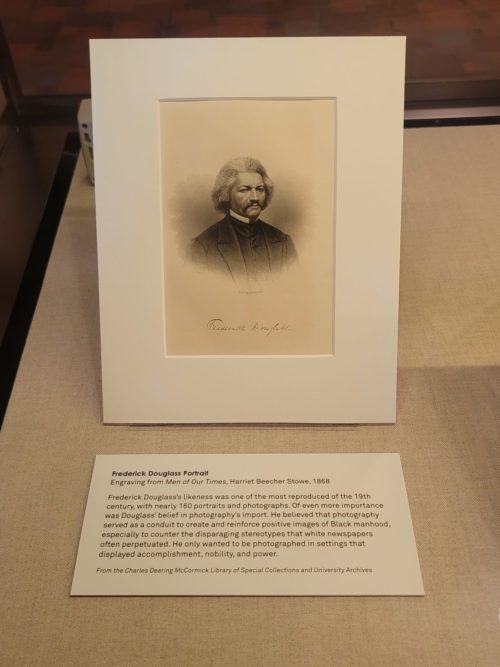Northwestern University opened an exhibit entitled “Freedom for Everyone: Slavery and Abolition in 19th Century America” on June 6 with rarely seen original documents of abolitionist and orator Frederick Douglass’ journey from enslavement to freedom and others that illuminate the experience of Back Americans in the 19th century.
 The documents are housed in the Charles Deering McCormick Library of Special Collections, University Archives, and the Melville J. Herskovits Library of African Studies. Original documents were removed after Juneteenth to protect from environmental exposure during the summer months and were replaced with facsimiles.
The documents are housed in the Charles Deering McCormick Library of Special Collections, University Archives, and the Melville J. Herskovits Library of African Studies. Original documents were removed after Juneteenth to protect from environmental exposure during the summer months and were replaced with facsimiles.
Marquis Taylor, a Ph.D. student in the history department, co-curated the exhibit. Taylor’s curatorial work started as an undergrad at Howard University, where he had the opportunity to do an exhibition for one of the first black sororities in the country. “When I came to Northwestern, I was working in special collections. It was suggested to do an exhibition for the newly redescribed and processed collections on Frederick Douglass, enslaved people, and free blacks in America,” says Taylor.
The exhibit includes The Frederick Douglass Collection, which comprises of 11 original letters, newspaper clippings, and six copies (five correspondence, one receipt). The collection was donated to Northwestern by businessman and newspaper publisher J.C. Shaffer. Shaffer’s brother, W.H. Shaffer, purchased some of the material in the late 19th century directly from Douglass’ former enslaver.
Other memorabilia include letters from enslaved people and free blacks. There are pieces of correspondence from free black men from Boston, Maine, and Maryland. The exhibit also amplifies Northwestern’s early African American graduates, such as Ferdinand Barnett, Dr. Daniel Hale Williams, and Emma Reynolds.

Charla Wilson, an archivist for the Black experience, loves history and wants to ensure that black archives are preserved and made available to learn about the past and hidden history.
Taylor and Wilson agree there is a need for more permanent exhibits of black history at colleges and universities, especially predominately white institutions.
“I think it’s an essential mechanism for showcasing the collections we have, but also when we are curating exhibits, we want to ensure the people are learning about the past. It’s a great way of providing background on the history of Northwestern’s past. We don’t want to forget the history of marginalized people. Some of those perspectives can get lost when we are not discussing them. Exhibits are a great way of doing that,” says Wilson.
“It’s important to engage with materials about African Americans in spaces like museums, especially at majority white universities. Coming from an HBCU, where that is something that we promote commonly, are materials about black people and our experiences. At a place like Northwestern and other white institutions, people need to understand black history. Sometimes, I think that people want to talk less about slavery. We need to have a better understanding of slavery because there is a way that it manifests itself in different ways in our lives and everyone’s lives,” says Taylor.
“Freedom for Everyone: Slavery and Abolition in 19th Century America” exhibit will be on display until December 2022. For more information, please visit their website.
Tammy Gibson is an author, re-enactor, and black history traveler. Find her on social media @sankofatravelher.
